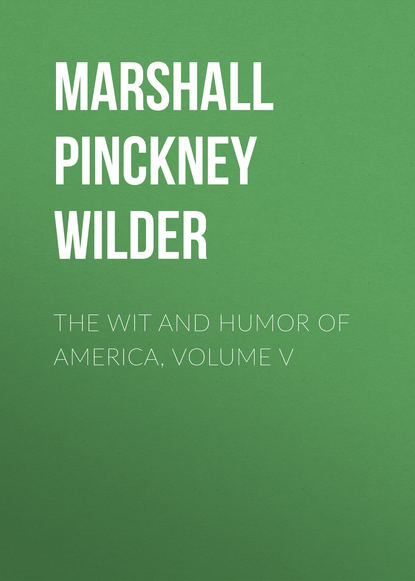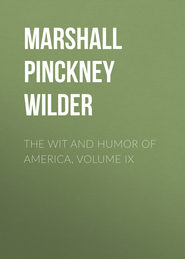По всем вопросам обращайтесь на: info@litportal.ru
(©) 2003-2024.
✖
The Wit and Humor of America, Volume V
Автор
Год написания книги
2019
Настройки чтения
Размер шрифта
Высота строк
Поля
"You'd jist as well not, daddy; I tell you I'm gwine to follow playin' cards for a livin', and what's the use o' bangin' a feller about it? I'm as smart as any of 'em, and Bob Smith says them Augusty fellers can't make rent off o' me."
The Reverend Mr. Suggs had once in his life gone to Augusta; an extent of travel which in those days was a little unusual. His consideration among his neighbors was considerably increased by the circumstance, as he had all the benefit of the popular inference that no man could visit the city of Augusta without acquiring a vast superiority over all his untraveled neighbors, in every department of human knowledge. Mr. Suggs, then, very naturally, felt ineffably indignant that an individual who had never seen any collection of human habitations larger than a log-house village—an individual, in short, no other or better than Bob Smith—should venture to express an opinion concerning the manners, customs, or anything else appertaining to, or in any wise connected with, the Ultima Thule of backwoods Georgians. There were two propositions which witnessed their own truth to the mind of Mr. Suggs: the one was that a man who had never been at Augusta could not know anything about that city, or any place, or anything else; the other, that one who had been there must, of necessity, be not only well informed as to all things connected with the city itself, but perfectly au fait upon all subjects whatsoever. It was therefore in a tone of mingled indignation and contempt that he replied to the last remark of Simon.
"Bob Smith says, does he? And who's Bob Smith? Much does Bob Smith know about Augusty! He's been thar, I reckon! Slipped off yerly some mornin', when nobody warn't noticin', and got back afore night! It's only a hundred and fifty mile. Oh, yes, Bob Smith knows all about it! I don't know nothin' about it! I ain't never been to Augusty—I couldn't find the road thar, I reckon—ha, ha! Bob—Sm-ith! If he was only to see one of them fine gentlemen in Augusty, with his fine broadcloth, and bell-crown hat, and shoe-boots a-shinin' like silver, he'd take to the woods and kill himself a-runnin'. Bob Smith! That's whar all your devilment comes from, Simon."
"Bob Smith's as good as anybody else, I judge; and a heap smarter than some. He showed me how to cut Jack," continued Simon, "and that's more nor some people can do, if they have been to Augusty."
"If Bob Smith kin do it," said the old man, "I kin, too. I don't know it by that name; but if it's book knowledge or plain sense, and Bob kin do it, it's reasonable to s'pose that old Jed'diah Suggs won't be bothered bad. Is it any ways similyar to the rule of three, Simon?"
"Pretty similyar, daddy, but not adzactly," said Simon, drawing a pack from his pocket to explain. "Now, daddy," he proceeded, "you see these here four cards is what we call the Jacks. Well, now, the idee is, if you'll take the pack and mix 'em all up together, I'll take off a passel from the top, and the bottom one of them I take off will be one of the Jacks."
"Me to mix 'em fust?" said old Jed'diah.
"Yes."
"And you not to see but the back of the top one, when you go to 'cut,' as you call it?"
"Jist so, daddy."
"And the backs all jist' as like as kin be?" said the senior Suggs, examining the cards.
"More alike nor cow-peas," said Simon.
"It can't be done, Simon," observed the old man, with great solemnity.
"Bob Smith kin do it, and so kin I."
"It's agin nater, Simon; thar ain't a man in Augusty, nor on top of the yearth, that kin do it!"
"Daddy," said our hero, "ef you'll bet me—"
"What!" thundered old Mr. Suggs. "Bet, did you says?" and he came down with a scorer across Simon's shoulders. "Me, Jed-diah Suggs, that's been in the Lord's sarvice these twenty years,—me bet, you nasty, sassy, triflin', ugly—"
"I didn't go to say that, daddy; that warn't what I meant adzactly. I went to say that ef you'd let me off from this her maulin' you owe me, and give me 'Bunch,' if I cut Jack, I'd give you all this here silver, ef I didn't,—that's all. To be sure, I allers knowed you wouldn't bet."
Old Mr. Suggs ascertained the exact amount of the silver which his son handed him, in an old leathern pouch, for inspection. He also, mentally, compared that sum with an imaginary one, the supposed value of a certain Indian pony, called "Bunch," which he had bought for his "old woman's" Sunday riding, and which had sent the old lady into a fence corner the first and only time she ever mounted him. As he weighed the pouch of silver in his hand, Mr. Suggs also endeavored to analyze the character of the transaction proposed by Simon. "It sartinly can't be nothin' but givin', no way it kin be twisted," he murmured to himself. "I know he can't do it, so there's no resk. What makes bettin'? The resk. It's a one-sided business, and I'll jist let him give me all his money, and that'll put all his wild sportin' notions out of his head."
"Will you stand it, daddy?" asked Simon, by way of waking the old man up. "You mought as well, for the whippin' won't do you no good; and as for Bunch, nobody about the plantation won't ride him but me."
"Simon," replied the old man, "I agree to it. Your old daddy is in a close place about payin' for his land; and this here money—it's jist eleven dollars, lacking of twenty-five cents—will help out mightily. But mind, Simon, ef anything's said about this hereafter, remember, you give me the money."
"Very well, daddy; and ef the thing works up instid o' down, I s'pose we'll say you give me Bunch, eh?"
"You won't never be troubled to tell how you come by Bunch; the thing's agin nater, and can't be done. What old Jed'diah Suggs knows, he knows as good as anybody. Give me them fix-ments, Simon."
Our hero handed the cards to his father, who, dropping the plow-line with which he had intended to tie Simon's hands, turned his back to that individual, in order to prevent his witnessing the operation of mixing. He then sat down, and very leisurely commenced shuffling the cards, making, however, an exceedingly awkward job of it. Restive kings and queens jumped from his hands, or obstinately refused to slide into the company of the rest of the pack. Occasionally a sprightly knave would insist on facing his neighbor; or, pressing his edge against another's, half double himself up, and then skip away. But Elder Jed'diah perseveringly continued his attempts to subdue the refractory, while heavy drops burst from his forehead, and ran down his cheeks. All of a sudden an idea, quick and penetrating as a rifle-ball, seemed to have entered the cranium of the old man. He chuckled audibly. The devil had suggested to Mr. Suggs an impromptu "stock," which would place the chances of Simon, already sufficiently slim in the old man's opinion, without the range of possibility. Mr. Suggs forthwith proceeded to cut all the picter ones, so as to be certain to include the Jacks, and place them at the bottom, with the evident intention of keeping Simon's fingers above these when he should cut. Our hero, who was quietly looking over his father's shoulders all the time, did not seem alarmed by this disposition of the cards; on the contrary, he smiled, as if he felt perfectly confident of success, in spite of it.
"Now, daddy," said Simon, when his father had announced himself ready, "narry one of us ain't got to look at the cards, while I'm a-cuttin'; if we do, it'll spile the conjuration."
"Very well."
"And another thing: you've got to look me right dead in the eye, daddy; will you?"
"To be sure,—to be sure," said Mr. Suggs; "fire away."
Simon walked up close to his father, and placed his hand on the pack. Old Mr. Suggs looked in Simon's eye, and Simon returned the look for about three seconds, during which a close observer might have detected a suspicious working of the wrist of the hand on the cards, but the elder Suggs did not remark it.
"Wake snakes! day's a-breakin'! Rise, Jack!" said Simon, cutting half a dozen cards from the top of the pack, and presenting the face of the bottom one for the inspection of his father.
It was the Jack of hearts!
Old Mr. Suggs staggered back several steps, with uplifted eyes and hands!
"Marciful master!" he exclaimed, "ef the boy hain't! Well, how in the round creation of the—! Ben, did you ever? To be sure and sartain, Satan has power on this yearth!" and Mr. Suggs groaned in very bitterness.
"You never seed nothin' like that in Augusty, did ye, daddy?" asked Simon, with a malicious wink at Ben.
"Simon, how did you do it?" queried the old man, without noticing his son's question.
"Do it, daddy? Do it? 'Tain't nothin'. I done it jist as easy as—shootin'."
Whether this explanation was entirely, or in any degree, satisfactory to the perplexed mind of Elder Jed'diah Suggs can not, after the lapse of the time which has intervened, be sufficiently ascertained. It is certain, however, that he pressed the investigation no farther, but merely requested his son Benjamin to witness the fact that, in consideration of his love and affection for his son Simon, and in order to furnish the donee with the means of leaving that portion of the State of Georgia, he bestowed upon him the impracticable pony, Bunch.
"Jist so, daddy; jist so; I'll witness that. But it 'minds me mightily of the way mammy give old Trailler the side of bacon last week. She a-sweepin' up the h'a'th; the meat on the table; old Trailler jumps up, gethers the bacon, and darts! Mammy arter him with the broom-stick as fur as the door, but seein' the dog has got the start, she shakes the stick at him, and hollers, 'You sassy, aigsukkin', roguish, gnatty, flop-eared varmint! take it along! take it along! I only wish 'twas full of a'snic, and ox-vomit, and blue vitrul, so as 'twould cut your interls into chitlins!' That's about the way you give Bunch to Simon."
"Oh, shuh, Ben," remarked Simon, "I wouldn't run on that way. Daddy couldn't help it; it was predestinated: 'Whom he hath, he will,' you know," and the rascal pulled down the under lid of his left eye at his brother. Then addressing his father, he asked, "War'n't it, daddy?"
"To be sure—to be sure—all fixed aforehand," was old Mr. Suggs' reply.
"Didn't I tell you so, Ben?" said Simon. "I knowed it was all fixed aforehand," and he laughed until he was purple in the face.
"What's in ye? What are ye laughin' about?" asked the old man wrothily.
"Oh, it's so funny that it could all 'a' been fixed aforehand!" said Simon, and laughed louder than before. The obtusity of the Reverend Mr. Suggs, however, prevented his making any discoveries. He fell into a brown study, and no further allusion was made to the matter.
It was evident to our hero that his father intended he should remain but one more night beneath the paternal roof. What mattered it to Simon?
He went home at night; curried and fed Bunch; whispered confidentially in his ear that he was the "fastest piece of hossflesh, accordin' to size, that ever shaded the yearth;" and then busied himself in preparing for an early start on the morrow.
Old Mr. Suggs' big red rooster had hardly ceased crowing in announcement of the coming dawn, when Simon mounted the intractable Bunch. Both were in high spirits: our hero at the idea of unrestrained license in future; and Bunch from a mesmerical transmission to himself of a portion of his master's deviltry. Simon raised himself in the stirrups, yelled a tolerably fair imitation of the Creek war-whoop, and shouted:
"I'm off, old stud! Remember the Jack-a-hearts!"
Bunch shook his little head, tucked down his tail, ran sideways, as if going to fall, and then suddenly reared, squealed, and struck off at a brisk gallop.
A PIANO IN ARKANSAS
By Thomas Bangs Thorpe








